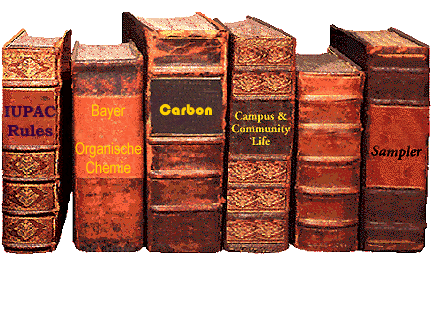The University of Missouri at Columbia
Chemistry 433 - Computational Chemistry - Winter Semester 1998

Course Materials I. Books and Model Sets.
Some of the content of this course is taken directly from the
primary and secondary literature. You will be given reading lists for
the various chapters containing the references to the literature discussed
in this course. You will also be given a list of pertinent books on the
various areas of computational chemistry. Many of these books are recent
and up-to-date. Consult them for details, references, and later on in your
own research. Three texts you might find useful to purchase for the
course and for future reference are:
(1)
Molecular Modelling. Principles and Applications.,
A. R. Leach;
Longman, Singapore, 1996.
ISBN 0-582-23933-8.
Cost US$ 51.92 (There has been a problem with the book order [AP3230511]
and the problem has been resolved. The books will arrive late January.)
(2)
Ab Initio Molecular Orbital Theory.,
W. J. Hehre, L. Radom, P. R. Schleyer, J. Pople
John Wiley & Sons, New York, New York, 1986.
ISBN 0-471-81241-2.
Cost US$ 145.00. (The books will be in the store in late January as
well. Talk to me if the cost is a problem.)
(3)
Exploring Chemistry with Electronic Structure Methods.,
James B. Foresman, AEleen Frisch, 2nd ed.;
Gaussian Inc.; Pittsburgh, PA, 1996. For ordering information,
contact Gaussian via info@gaussian.com.

Course Materials II. Software Options.
An attempt is made at integrating computer software into Chemistry 433.
Inside and outside of the classroom, we will make use of the world wide
web as a tool for instruction. See "Software & Webware" on the
Chemistry 433 Course Web Site.
Prerequisites
It is assumed that you are familiar with the concepts and
principles covered in Chemistry 233, Physical Chemistry (Continuation of
231. Covers wave mechanics, bonding, molecular spectroscopy, and
statistical mechanics.)
Activities
I. Lectures
It is very important that you come to class well prepared! Do
read the background material before it is covered in class. If secondary
or primary literature will be discussed, make sure you have read the
article(s) before the lecture. The lecture
will be much more beneficial to you if you do. One of the advantages of
being well prepared is simply that you need to write much less during the
lecture and, instead, you will be able to follow the lecture
intellectually. After the lecture, read the material again and test
yourself, possibly in small groups. If uncertainties remain, review the
material again or come to office hours.
II. Exercises - General, Specific and Online
General Exercises:
Throughout the semester, we will read current articles on computational
chemistry and discuss the items. Much of this discussion will occur on a
discussion list. Written discussion will improve your communications
skill on the topic tremendeously. Please refer to the instructions
concerning the organization of Paper
of the Week exercise.
Specific Exercises:
I will select from various sources or generate and distribute (in hardcopy
or electronic form) problems relating to specific topics discussed in
lecture. Assignments will be posted on the Chemistry 433 Course Web Site.
You are not required to return the answers. On occasion, we might
discuss these problems in review/discussion sections.
Online Exercises: There are quite a
few useful computational chemistry related web sites out there. We
will make attempts to harvest whatever knowledge can be gained from
such sources. Assignments will be posted on the Chemistry 433 Course Web
Site. Eventually, there will be a little collection of interesting sites
added to the Chemistry 433 Course Web Site. Feel free to inform me about
sites you would like to have added.
III. (Group) Collaborative Term Projects and Peer
Review
Depending on enrollment, the term projects will be pursued by individual
students or by small groups. I greatly favor group projects and groups of
three would be ideal. We will have to see.
Case studies are the best way to exercise the concepts discussed in the
lecture. The identification of an application of modern computational
methods in the current literature and the creation of a problem
assignment are the subject of
Project #1.
Perhaps the most difficult aspect of computational chemistry relates
to the identification of the right tool for the job. The
Project #2 is designed to
address this issue.
Both (Collaborative) Term Projects
will be evaluated via peer review. Aside from learning content, you will
be learning how to judge / be judged via peer review.
Your ability to prevail in peer review will, certainly no less than
content knowledge, affect your success in future.
IV. Reviews - Discussion List
If necessary and desired, discussion/review sessions will be
scheduled in the evening in order to fit in with your schedules. These
sessions are intended to serve three purposes: First, further discussion
of the more difficult topics presented in class (not additional
material), secondly, discussions of problems, and - most importantly -
general Q&A and problem solving strategies. Dates will be announced in
class as required.
See also link reviews.
To encourage discussions amongst yourselves, you will be subscribed
to an electronic discussion list. Details about the discussion lists
will be given in lecture.
See also links to showme accounts
and discussion list.
Examinations and Grading
The Greek philosopher Socrates
argued that the unexamined life is not worth
living.
Accordingly, there will be
two 1-hour-examinations (100 points each),
two quizzes (50 points each),
two term projects (100 points each),
and a comprehensive final (100 points)
for a total of 600 points.
Quizzes are limited to inquiring facts dealt with in the lecture or in
homework. Tests will assess your level of understanding of the material
covered in the lecture. The tests will contain but are not limited to
lecture material and homework material. In tests you are expected to
abstract from the latter and apply it to different scenarios.
No grades will be assigned to individual tests, quizzes and projects.
After each examination you will be given a graph representing the
performance of the class that will enable you to assess your relative
performance. Grades will then be assigned on the basis of the
average and the distribution width of the normed course performance
diagram (frequency of score versus scores) such as to realize a
grade point average of about 1.6 or 1.7. You may take a look at the
instructor's
Chemistry 210 WS97 and
Chemistry 416 FS97
sites to find
previous
implementations of this grading scheme. Note one difference, however, in
that the point-grade relation will be settled after all tests, quizzes,
projects and the final are completed. A normed total score distribution
will be made available after all tests and quizzes and including scores
for the term projects.
Deadlines for submissions of semester projects and for the submission
of peer reviews are specified on the assignments and also can be found on
the Chemistry 433 Schedule. Unless
there exists a good reason, submissions received after the deadline
will not be graded and automatically receive a score of zero points.
In concert with the policy of the Department of Chemistry, there
will be no make up exams. If a test is missed for a legitimate reason
(sickness and the like with some type of acceptable written proof), a
score will be determined for this missed test that is based on your
average overall performance. If you know in advance, that you will not
be able to take an exam for a certain reason, talk to the instructor
before the date of that test. If you do miss a test without a legitimate
reason, you will receive a score of zero points for that test.
Time and date of the final examination are determined by Article V of
the Academic Regulations which are designed to protect students from
irregularities in the administration of final examinations. The following
two excerpts from Article V are relevant to this graduate class.
(1) No teacher will hold an examination during any time other than the
regular meeting time of the class or the time as approved by the Registrar
for both final and multi-section examinations. The only exception is that
examinations in courses numbered 400 and above may be conducted at any
time agreeable to both the teacher and the students.
(2) No examination may be held during Stop Day.
Academic Honesty
Academic honesty is fundamental to activities and principles of a
university. All members of the academic community must be confident that
each person's work has been responsibly and honorably acquired,
developed, and presented. Any effort to gain an advantage not given to
all students is dishonest whether or not the effort is successful. The
academic community regards academic dishonesty as an extremely serious
matter, with serious consequences that range from probation to
expulsion. When in doubt about plagiarism, paraphrasing, quoting, or
collaboration, consult the course instructor. Proven academic dishonesty
will be reported to the Provost for Academic Affairs and the studentŐs
Dean.
Compliance with the Americans with Disabilities Act
If you have special needs as addressed by the Americans with
Disabilities Act (ADA) and need accommodations (for example, extended
testing time, note takers, large print materials), please inform your
instructor privately as soon as possible. In most circumstances,
students with disabilities seeking academic accommodations should also
register with the Access Office, A048 Brady Commons, 882-4696. As
necessary, the Access Office will review documentation about your
disability and about the need for accommodations you are requesting. The
Access office will then assist in planning for any necessary
accommodations.
Excellence is a Habit